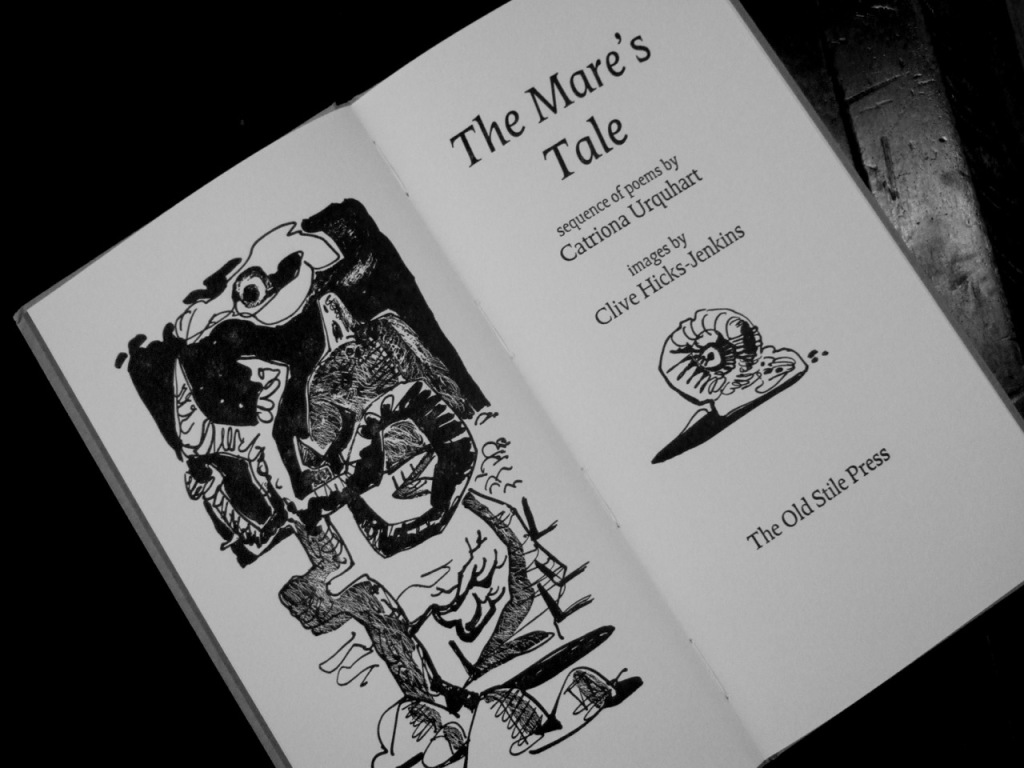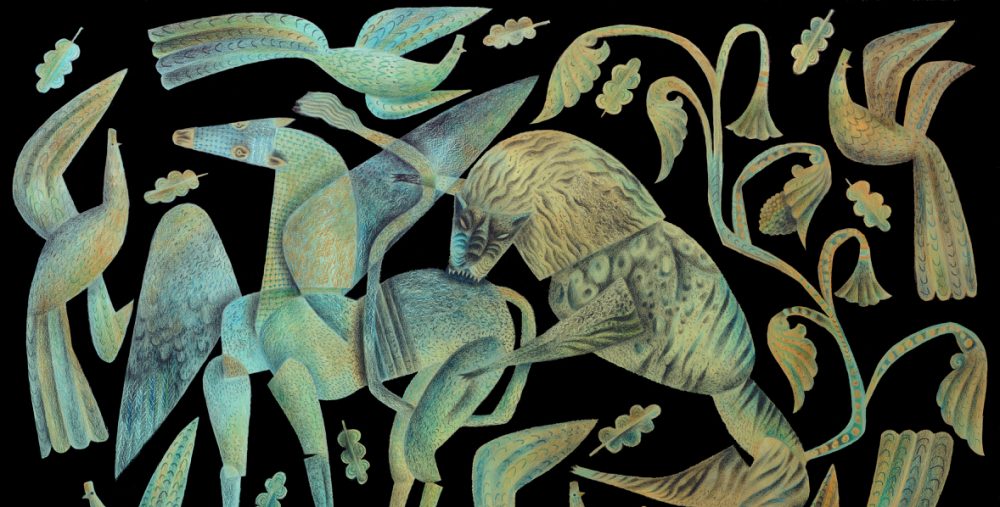
In her poem Mares’ Tails Catriona Urquhart recalls the narrator’s unease at the sight of linen bed-sheets on his mother’s washing-line. In this and all but two of the titles in the poetry collection, the poet ventriloquises her subject, my father, Trevor. Catriona was a great gatherer of stories, and in her years of friendship with my father, she collected and stored many of his. She winkled out of him far more than he’d ever shared with his family. I think he was unguarded with her, and recalled his life with real pleasure.
Mares’ Tails
I lie
and coax the clouds down
from the sky
and grab the mares’ tails
and fly
far up
into the blue
and gazing down see
all my landscape
small and strange and new.
The church tower squat and square,
the lilac shadows of the vicar’s yews,
the brook, a silver eel
that snakes around the patient cows,
mere dots of brown.
Ed Hockey, bicycling from the town
seems not to move.
My mother’s washing line
is pegged with people:
Joan and Hetty billow out
but Herb hangs limp
and Vince is twisted at the end.
The linen sheets
that pinion me at night
encasing me in wild dreams,
terror, nightmare,
are waving free
so innocently.
You could not think
they meant to choke and smother.
Catriona Urquhart (1953 – 2005)
It was so very easy to share with Catriona, because when she loved a person she bestowed her full attention and appreciation. Trevor revelled in that. They used to go off on little adventures together, him whisking her away to his favourite country pubs and beauty spots around Monmouthshire, or his regular Italian cafe for lunch in Newport’s docklands, where Maria always had his place set for him. These were his late years and Catriona, who was reeling from the loss of her father, found comfort in mine. Trevor loved this late-blooming friendship, unlikely though it was. He twinkled in her company. They both twinkled.
Trevor didn’t make it into the new millennium. He died at age eighty-six in 1999. He’d been eighty-four when he’d opened up and shared with us the strange event of his childhood that had shaped his life, so there had been just two years for us – for me and Catriona – to gather what facts we could of the occasion when the midwinter mummers had called at his home and Trevor, who was just a toddler, believed the Devil had come for him. It was unlikely that in the hurly-burly of excitement anyone present saw or recognised the effect of the child’s encounter with a ‘Mari Lwyd’. (Grey Mare) Thereafter Trevor believed with the simple certainty of a child, that if ever he spoke of what he’d witnessed, then the Devil would return to carry him away. And because he never told another soul, the memory stuck. He didn’t recognise it for what it was – a celebratory folk tradition – because in imagination it had grown into something private and terrifying, an atavistic horror carried with him into adulthood and hidden away from sight. He simply had no idea that the Devil was a decorated horse’s skull on a stick, with the capering operator hidden beneath a shroud-like draped bedsheet.
All his life Trevor was terrified of entangling sheets, whether too tight on beds or cracking in winds on washing-lines. He never read a ghost story, not a single one, but had he laid eyes on M. R. James Oh Whistle and I’ll come to You My Lad, he wouldn’t have got into a bed again, ever. In hospital, at the end, with his dreams resurrecting old fears, he fought with sheets tucked tight by caring nurses to prevent him falling out of bed. I loosened him and murmured soothingly, stroked his forehead and told him everything would be fine. And then at the end, it was, and he was still.
Catriona died on May Day in 2005. She was a mere fifty-two. She’d been drifting on a tide of Morphine, surfacing infrequently, briefly and peacefully in those last weeks, cared for by those who loved her and the wonderful Macmillan nurses, tending and vanquishing her pain. It’s said she chose her time, May Day having always been significant for her, so perhaps at some deep level she knew the calendar date and took her leave on the day she loved.
The Mare’s Tale was the sole volume of Catriona’s poems published in her lifetime. The poems were originally intended as the text for my 2001 exhibition of the same title, but when Nicolas McDowall of Old Stile Press came to our house and found her manuscript on our kitchen table, he decided the collection must be suitably honoured in a beautiful edition. And so it was, illustrated by me, printed by Nicolas at Catchmays Court in the Wye Valley, bound in super-fast time by The Fine Bindery and published by Old Stile Press. Launched at the opening of the exhibition at Newport Museum and Gallery, it was the only collection of poems published in Catriona’s lifetime. She destroyed all her earlier work, a fact discovered only after her death. She was always hardest on herself, and had clearly taken in hand what she chose to be remembered by. The Mare’s Tale is a small masterpiece and we are lucky to have it. She was a wordsmith down to her bootlaces.
Clive Hicks-Jenkins, May Day 2023

Heartbreaking, moving, but ultimately a wonderful story.
Dear Clive :
What a beautiful remembrance of Catriona and of your Father. I am a late comer to The Artlog, but still, every year, on May Day, I read again my volume of The Mare’s Tale as a kind of prayer, in Catriona’s honour, in Trevor’s honour, and in Your’s.
Thank you so much.
Love from Madrid
Dearest Maria, I’m so touched to know you read Catriona’s poems each May Day, as do I. So many years swiftly passed, and yet she is as present in my mind as had I seen her yesterday. Peter and I send our warmest good wishes to you from west Wales. XXX
¡¡¡ Un fuerte abrazo para los dos !!!